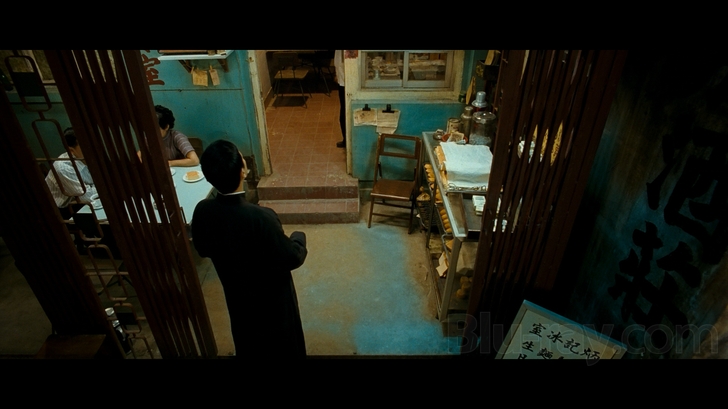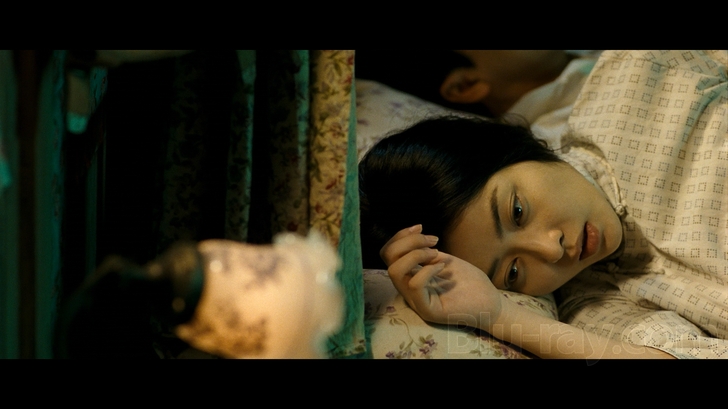Ip Man 2 Blu-ray Movie
HomeIp Man 2 Blu-ray Movie 
Yip Man 2 / Legend of the Grand Master | 葉問2 | Collector's EditionWell Go USA | 2010 | 109 min | Rated R | Apr 19, 2011

Movie rating
7.6 | / 10 |
Blu-ray rating
| Users | 4.5 | |
| Reviewer | 4.0 | |
| Overall | 4.1 |
Overview
Ip Man 2 (2010)
Centering on Ip Man's migration to Hong Kong in 1949 as he attempts to propagate his discipline of Wing Chun martial arts.
Starring: Donnie Yen, Xiaoming Huang, Sammo Kam-Bo Hung, Lynn Xiong, Kent ChengDirector: Wilson Yip
| Action | Uncertain |
| Martial arts | Uncertain |
| Foreign | Uncertain |
| History | Uncertain |
| Biography | Uncertain |
Specifications
Video
Video codec: MPEG-4 AVC
Video resolution: 1080p
Aspect ratio: 2.35:1
Original aspect ratio: 2.39:1
Audio
Cantonese: DTS-HD Master Audio 5.1
Mandarin: DTS-HD Master Audio 5.1
English: DTS-HD Master Audio 5.1 (48kHz, 16-bit)
Cantonese: Dolby Digital 2.0
Mandarin: Dolby Digital 2.0
English: Dolby Digital 2.0 (224 kbps)
DTS HD-MA mixes are 16-Bit; All DD 2.0 mixes are 224 kbps
Subtitles
English
Discs
50GB Blu-ray Disc
Two-disc set (1 BD, 1 DVD)
Packaging
Slipcover in original pressing
Playback
Region free
Review
Rating summary
| Movie | 4.0 | |
| Video | 4.0 | |
| Audio | 4.0 | |
| Extras | 3.5 | |
| Overall | 4.0 |
Ip Man 2 Blu-ray Movie Review
Gonna fly now, kung fu edition.
Reviewed by Jeffrey Kauffman April 10, 2011The first Ip Man film ended with a shocking development and then a quick summary which covered literally decades in the life of its title hero, real life martial arts master Yip Kai-Man (also known as Ip Man). For a film as well crafted and viscerally exciting as the first Ip Man inarguably was, it seemed almost like the filmmakers had simply run out of time or money and decided to end that film where it did. What’s perhaps even stranger is that those very same filmmakers, perhaps realizing they had a hit of international proportions on their hands, had already announced Ip Man 2 before the release of the first film. Despite the oddly truncated feeling ending of the first Ip Man, nothing could seriously detract from that film’s excellent, if highly fictionalized, recreation of a tempestuous time in Chinese history. The first film focused largely on the era of Japanese invasion and occupation, prior to the outbreak of World War II. Legendary Wing Chun master Ip Man, a force to be reckoned with in his hometown of Fo Shan (also transliterated as one unbroken word, Foshan), finds his life turned upside down with the arrival of the Japanese. Where before he had only to deal with the occasional disapproval of his wife and the equally occasional foray into the town by a competing martial arts “expert” (who of course was completely inadequate to the task of taking on Ip Man), suddenly under the new reality of Japanese occupation, Ip Man found his very life, and that of his wife and small son, at stake.

Ip Man 2 bears the subtitle Legend of the Grandmaster, and if the first Ip Man spent most of its time setting up the character of the legendary martial arts teacher and mentor, and then putting him through his paces, both physically and emotionally, the second film moves into more traditional territory, with a highly fictionalized look at Yip Kai-Man’s (Donnie Yen) tenure in Hong Kong after World War II. This was an economically fragile time when ever formerly well to do people, like Yip himself, had to scrounge for a living. In the film, there’s a huge network of competing martial arts schools already up and running in Hong Kong, and they all pay protection money under a racket helmed by Hung Chun-nam (Sammo Hung, the fight choreographer of both Ip Man films), a master in the competing Hung Kuen protocol. Of course both masters must engage in a battle to prove who’s system is most efficacious, but Ip Man 2 ups the ante by having Yip face the entire city’s worth of kung fu masters of various stripes in one of the film’s astounding set pieces, in this case one where the fighting takes place entirely on top of a precariously balanced restaurant table.
Ip Man 2 is decidedly more of a mainstream martial arts film than was the first Ip Man, and in fact that is both boon and bane for the film. The boon is that this film is probably more accessible to the public at large, as it derives a lot of its excitement from several spectacularly staged fight scenes. While there is certainly passing attention paid to character and a certain dramatic arc, this is much more of an anecdotal film than the first Ip Man, a loosely strung together set of vignettes waiting more or less for the next incredible fight sequence to start. And that’s the bane of Ip Man 2: this is in some ways a much more cartoonish approach toward its subject than the first film was, despite Donnie Yen’s continuing impressive presence as Yip.
In terms of the character interrelationships, the best aspect here is in the interplay between Yip and Hung, two masters of competing schools who start out as fierce adversaries but who slowly begin to understand each other. Unfortunately the film deals in shorthand even with this element, and several aspects of their relationship seem to simply leapfrog forward without a great deal of nuance or frankly even logic. But the exaggerated cartoon aspect becomes almost ridiculous in a couple of portrayals of the British, who in a way supplant the “evil” Japanese of the first film. Here we get both a corrupt police official and an arrogant British boxer (played by Darren Shahlavi), both of whom don’t exactly do King and Country proud, so to speak. This film was obviously made with its native Chinese audience first in mind, and so this sort of chauvinistic (even xenophobic) nationalism can be understood on a certain level, but it deprives Ip Man 2 of a more balanced and finesse filled approach toward its subject.
As with the first film, elements are invented whole cloth and some actually rather interesting facts about Yip are ignored altogether. This is a film which wants to celebrate a national hero without even admitting there are any warts underneath the noble and precise façade, and while again that may be understandable, it robs the film of real character and shading. Yip is simply too good to be true, a noble man who fights only for good, not for evil, in that most hackneyed of phrases which this film seems to aspire to without a second thought.
Where Ip Man 2 undeniably, and probably even more than the first iteration, is in its very stylish visual sense, something rather interesting in that it was directed by Wilson Yip, the same man who helmed the first Ip Man. But this is a much more impressive production from a camerawork standpoint, with careening and cartwheeling shots that probably used every crane operator available in the Chinese film industry. Also much more fabulous, even extravagant, in Ip Man 2: Legend of the Grandmaster, is the attention paid to a series of incredible fight sequences. The middle section of the film is filled with one amazing set piece after another, so much so in fact that the final showdown between Yip and the British boxer seems like a decided anticlimax, at least from a fight choreography standpoint.
This second film was evidently supposedly meant to focus on Yip’s relationship with Bruce Lee, but problems with Lee’s relatives prevented Lee from being portrayed in Ip Man 2, save for a brief coda where he’s shown as a “presumptuous” (Yip’s word in the film) child. Since Yen is on record as saying he isn’t interested in returning to the role, especially with a glut of other Ip projects already either released or greenlit, these two movies may be (may be—as anyone who follows huge box office returns and the vagaries of star’s minds changing will attest) the only chances to see Yen in one of the most commanding performances of his career. Though Ip Man 2 is decidedly more contrived and programmatic than the first Ip Man, it also can’t be denied that the film packs a solid punch, figuratively and of course literally. While its nationalistic elements probably speak most loudly to the Chinese, anyone who has ever rooted for the “hometown hero” will understand the pride the Chinese have in Yip, and the esteem in which he’s held to this day.
Ip Man 2 Blu-ray Movie, Video Quality 

I found the first Ip Man on Blu-ray to be a somewhat confounding affair. While its AVC encoded 1080p image was often incredibly sharp (maybe too sharp, looking harshly digital at times), the entire film had a drab, colorless look that really started to bother me after a while, especially considering that film's precise and often breathtaking recreation of the China of that time. The good news is that Ip Man 2, also offered on Blu-ray with an AVC encoded 1080p transfer in 2.35:1, is considerably more robust in the color category, something that is immediately and readily apparent by simply watching the films back to back. Flesh tones are notably more saturated, the entire palette pops in a way that the first film never did, and there are often gorgeous and very deeply drenched hues that help elevate the visual interest in this film considerably. Sharpness and clarity are top notch, and fine detail is pleasing, especially in some of the close up shots. This release is plagued by some fairly consistent aliasing, which hobbles everything from palm fronds to some of the geometric patterns on costumes and sets. Otherwise, though, this is a great looking release that is certainly much more satisfying than the first Ip Man.
Ip Man 2 Blu-ray Movie, Audio Quality 

Three lossless DTS-HD Master Audio 5.1 tracks grace this new Blu-ray, the original Cantonese, an additional Mandarin track, and the expected English dub. If you're a stickler for lip movements matching the sounds emanating from them, stick with the Cantonese track, which is in fact what the disc will default to. The Cantonese track is very well realized here, and is considerably more immersive than the first Ip Man's soundtrack was, simply by dint of the fact that there are many more action sequences in this film. One thing that is perhaps a bit bothersome in this film is the wrongheaded decision to crowd the soundfield with nonstop underscore as well as sound effects in a couple of fight sequences, something that actually distracts from the action a time or two. Otherwise, this is bristling good fun, with lots of discrete effects well placed around the side and rear channels. Dialogue is clear (though obviously looped a lot of the time), and fidelity is excellent throughout the film. There are some nice, if relatively restratined, uses of LFE dotting the film for those of you who like that subwoofer to kick into action (so to speak).
Ip Man 2 Blu-ray Movie, Special Features and Extras 

As with the Collector's Edition of the first Ip Man, bonus content is spread over the BD which contains the main feature as well as the
accompanying DVD.
The BD contains:
- Making Of Ip Man 2 (1080i; 17:37) is an interesting featurette offering interview snippets with director Wilson Yip and many of the principal cast, including Donnie Yen. They discuss how the characters are different in this film and what their intentions were in moving the story of Yip forward to the 1950s.
- Trailers and Teaser
- Behind the Sets looks, as may be obvious from the title, at various sets utilized within the film. These include:
The Community (2:54) which includes Yip's initial rooftop studio;
The Fish Market (2:18) one of the recreations of Hong Kong's market region;
Chinese Restaurant (2:26) site of the spectacular fight sequence between Yen and Hung on top of the table;
Big and Small Arena (2:18) where the boxing matches take place. - Shooting Diary (3:05) is really more of a long form trailer, with no dialogue, just music and onscreen titles (in Chinese translated into English via forced subtitles) and a series of scenes from the film.
- Deleted Scenes (9:07) start out without sound, but don't get concerned. There are a few longer scenes of sequences which are already in the film, including some nice bits with Hung's family, as well as the two long boxing sequences which are a highlight of the film.
- Interviews comprise the longest section of the DVD extras. Director Yip and all of the principal cast are interviewed. All of the
cast interviews begin with the onscreen question asking the actor to describe their character, and then the interviews cover a wide range of subjects,
including background on Yip, the film itself and various tangentially related subjects like martial arts expertise. The interviews are:
Wilson Yip (3:04)
Donnie Yen (3:38)
Sammo Hung (6:44)
Huang Xiao Ming (16:54)
Darren Shahlavi (14:13)
Ziong Dai Lin (5:56)
Simon Yam (4:51) Fan Siu Wong (3:29)
To Yue Hong (13:30)
Kent Cheng (5:36)
Ashton Chen (5:51)
Pierre Ngo (6:03)
Ip Man 2 Blu-ray Movie, Overall Score and Recommendation 

Ip Man 2 is more formula driven than the first Ip Man was, but that actually may make this film more appealing to many people, as its phenomenal box office seems to have proven already. The fight sequences in this film are stunningly staged and filmed, and indeed director Wilson Yip seems to have considerably upped his game on this sequel. Yen is a very appealing hero, however fictionalized this version of Ip Man actually is. The image quality, specifically the color, on this Blu-ray release is head and shoulders over the first Ip Man's Blu-ray release, and the sound design is also quite involving a lot of the time. Despite this film's pretensions and flaws, it still comes Highly recommended.
Other editions
Ip Man 2: Other Editions

Ip Man 2
Yip Man 2 / Legend of the Grand Master | 葉問2
2010

Ip Man 2
Yip Man 2 / Legend of the Grand Master | 葉問2
2010

Ip Man 2 4K
Yip Man 2 / Legend of the Grand Master | 葉問2
2010
Similar titles
Similar titles you might also like

Ip Man 3 4K
2015

Ip Man 4K
2008

Ip Man 4: The Finale
Yip Man 4
2019

The Legend Is Born: Ip Man
Yip Man chinchyun / 葉問前傳
2010

Legend of the Fist: The Return of Chen Zhen
Jing mo fung wan: Chen Zhen
2010

Shaolin
新少林寺
2011

Ip Man: The Final Fight
Yip Man: Jung gik yat jin / 葉問-終極一戰
2013

Ong Bak 2: The Beginning
2008

Ong Bak 3: The Final Battle
2010

Tai Chi Hero
Tai Ji 2: Ying Xiong Jue Qi
2012

Fearless
Huo Yuanjia | 霍元甲 | Theatrical, Unrated, & Director's Cuts
2006

True Legend
Su Qi-Er
2010

Chocolate
2008

Bloodsport
1988

Man of Tai Chi
2013

Birth of the Dragon
2016

Tai Chi Zero
Tai Chi 0
2012

Fist of Legend
精武英雄
1994

The Grandmaster
一代宗師 / Yi dai zong shi
2013

Five Superfighters
Tang shan wu hu / 唐山五虎
1979